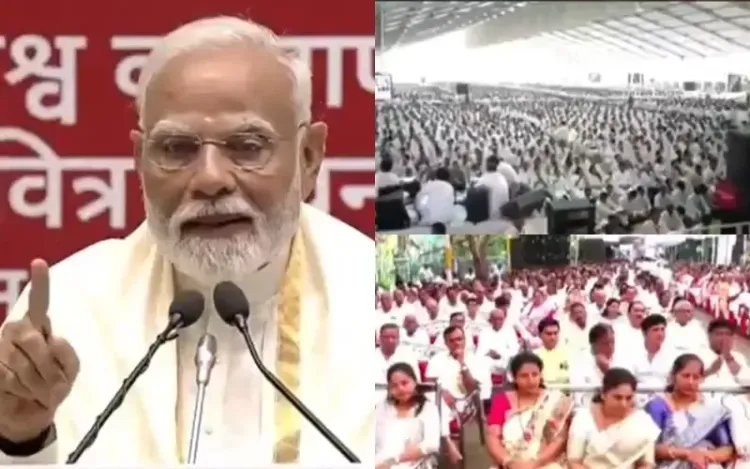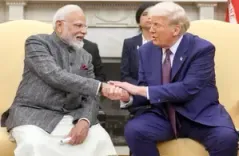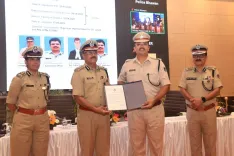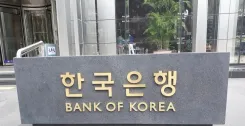From Local Advocacy to Water Preservation: PM Modi Advocates for 'Nav Sankalp' to Forge a Brighter Future

Synopsis
Key Takeaways
- PM Modi introduced nine resolutions for a sustainable future.
- Emphasis on water conservation as a critical resource.
- Encouragement to adopt local products over foreign goods.
- Promotion of natural farming and healthy living.
- Call for collective responsibility in societal improvement.
New Delhi, April 9 (NationPress) Prime Minister Narendra Modi addressed a global audience on Wednesday during the inauguration of Navkar Mahamantra Diwas, where he introduced nine resolutions known as "Nav Sankalps," aimed at fostering a more sustainable, healthy, and prosperous future for the nation.
Drawing inspiration from the profound spiritual teachings of Jainism, PM Modi encouraged the younger generation to embrace these values in their everyday lives, assuring that they will bring energy, direction, and peace to society.
He highlighted the necessity of collective accountability in crafting a brighter tomorrow. "For the youth, this is not merely a mantra but a guiding principle. As we chant the Navkar Mantra today, let’s vow to implement these nine resolutions for the betterment of our community, environment, and nation," he stated.
The initial resolution concentrated on the critical need for water conservation, a resource PM Modi remarked has become increasingly vital. He recalled a prophecy by Buddhi Sagar Maharaj Ji over a century ago, predicting that water would eventually be sold in grocery stores. With this in mind, he urged citizens to appreciate the significance of every drop and commit to conserving water.
"Save water, for every drop matters. Today, we must acknowledge the value of each drop, ensuring that future generations can access this essential resource," PM Modi emphasized.
The second resolution, "Ek ped Maa ke Naam," focuses on environmental preservation by promoting afforestation.
"In recent months, we have planted over 100 crore trees nationwide. Let’s continue this initiative by planting trees in our mothers' names, as nature nourishes us all," he noted.
The third resolution pertains to cleanliness and hygiene, aligning with the ongoing Swachh Bharat Mission. PM Modi urged citizens to contribute to maintaining a clean environment and stressed that true freedom is found in a life devoid of violence, where every street symbolizes cleanliness.
The fourth resolution promotes a "Vocal for Local" mindset. PM Modi encouraged people, especially the youth, to recognize their dependence on foreign-made products and to choose items that reflect India’s rich heritage and craftsmanship.
"Make a list of foreign-made products you use daily. You may be astonished by how much we rely on them. Commit to reducing this reliance every day. Let’s support products that embody the essence of India’s soil," he stated.
The fifth Sankalp, "Desh Darshan," highlighted the significance of exploring India, encouraging individuals to discover their own country before traveling abroad. "India boasts captivating destinations. Travel within India to witness its beauty, history, and diverse culture before venturing into the world," PM Modi urged.
The sixth resolution advocates for "natural farming," emphasizing sustainable agricultural practices. PM Modi referenced Jain teachings advocating harm-free living and urged farmers to abandon chemical fertilizers in favor of natural farming methods to safeguard the environment.
"As Jain scriptures articulate, no living being should inflict harm on another. Let us liberate our mother earth from the burden of chemical fertilizers and adopt natural farming practices," PM Modi advised.
The seventh Sankalp promotes healthier living, particularly through incorporating millet into diets and reducing oil consumption. "To combat obesity, we need to integrate millet into our daily meals and lower oil intake by 10 percent," he asserted, highlighting the importance of nutritious eating habits.
In the eighth resolution, PM Modi urged citizens to adopt yoga and sports in their daily routines, regardless of location—home, office, or park. "Integrate yoga and sports into your lifestyle. It’s essential not just for fitness but also for mental well-being and tranquility," he emphasized.
The ninth Sankalp centers on aiding the underprivileged and supporting those in distress. "True service involves reaching out and filling someone’s empty stomach," PM Modi stated, urging citizens to assist the less fortunate.
"These Nav Sankalps will infuse new energy, direction, and peace into our society. I assure you that by adhering to these resolutions, our future generations will enjoy a life of prosperity and harmony," PM Modi declared.
This event, a global initiative, witnessed participation from individuals across over 108 countries, promoting peace and universal harmony. The occasion emphasized the collective recitation of the revered Navkar Mahamantra, a core tenet of Jainism.
The Prime Minister commended the timeless and universal essence of the Navkar Mantra: "The Navkar Mantra is indeed a mantra of human focus, spiritual practice, and inner purification. It embodies a global perspective. Similar to other eternal Indian traditions, Shruti, Smriti, and customs, this timeless mantra has been orally transmitted for centuries, later inscribed on stone, and eventually preserved through natural manuscripts."
On the cultural and philosophical significance of the number 'nine' in Jainism, PM Modi remarked, "Life comprises nine fundamental elements, guiding it towards completeness. Hence, the concept of 'Nav' (nine) holds particular importance in our culture. In Jainism, we have the Navkar Mantra, Nav Tattva (nine principles), Nav Punya (nine virtues), and in other traditions."
He also acknowledged Jainism's profound influence on India's identity: "Jainism has played a crucial role in shaping India's identity. We remain committed to preserving and honoring this heritage."
Moreover, he highlighted the necessity of safeguarding Jainism's intellectual contributions:
"The literature of Jainism constitutes the foundation of India's intellectual wealth. It is our responsibility to preserve this knowledge. That’s why we have granted official language status to Prakrit and Pali. This will facilitate in-depth research on Jain literature."
PM Modi shared his personal reflections on the relevance of Jainism in addressing global challenges: "The more I learn and understand about Jainism, the more I realize its deep scientific roots and compassion. The global issues we face today, whether war, terrorism, or environmental crises, can find solutions rooted in the core principles of Jainism," he concluded.









